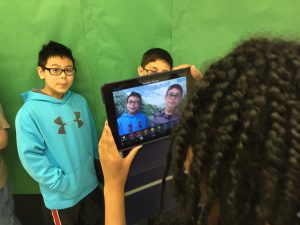Dream and innovate - these are goals that I set for my students. Finding opportunities for them to realize these goals has grown complicated because, as educators, it’s mandatory for us to focus on standardized tests in our current educational landscape.
However, state test scores do not tell the entire story. As facilitator and editor-in-chief of my students’ success, it is necessary to ensure students feel there is value in their education.
Meaningful learning experiences don’t happen on their own. If we want to encourage learning beyond the test, we need to intentionally design it as part of our learning activity. These are the strategies I use to provide meaningful learning opportunities.
Dream
Each January, I poll my students by asking them to identify their own dreams for the New Year as well as ten years down the road. Knowing their passion and where they want to go at a young age allows me to expose them to new opportunities. For instance, the large number of students who dream of being a professional athlete is often in the small percentage of those who actually make it into the professional ranks. However, there is still a passion for sports that can be recognized and harnessed into exploring a potential career.
- Encourage students to explore careers related to their interests. For example, a sports fanatic can explore becoming an athletic trainer, sports writer, or sports information director at a college or university. To learn more, they can speak with a high school athletic trainer about the profession or watch authentic career videos. One classroom resource we use for career exploration is Defined Learning which has hundreds of online career-focused performance tasks, videos, and research resources.
- Set up a Skype meeting with a professional. For example, I set up Skype meetings for my students with a former colleague of mine who works as a professional sports announcer and writer. The activity began with creating a bank of questions about the profession – not the glory of being around professional athletes or knowing them – which we practice prior to the real Skype conversation.
- Challenge students to create a visual map that displays their path to achieving their dream. I instruct my students to create a timeline on Instagram showing important life moments they anticipate experiencing (e.g., graduating high school, going to college, getting a job, being accepted into a master’s program). It is simply a visual map to reinforce their dream, and they get to be as creative as they wish. To submit the project, students must submit their own personalized hashtag so I can search for each project on Instagram.
Innovate
Abandon the traditional assessment and rewire your thinking to align with the 21stcentury learners in your classroom. Students are creators of media using all sorts of technology, but often they are forced to power down during school hours. Instead, open a charging station in your room, incorporate the technology into your curriculum, and take a risk to train and trust students to use their devices for educational purposes.
- Allow students to use online resources. Informational and argumentative texts are a large part of my curriculum. I encourage my students to use online research resources that cover articles on current events including opinion editorials.
- Have students create a green screen production. Every student attending school in the current educational landscape should have completed a green screen production before matriculating. This type of creative learning offers students with varying learning levels the same opportunity to excel. The teamwork and collaboration skills required to layout the production prior to its creation are valuable skills that go beyond the classroom.

It is tempting for educators to stay in their comfort zone when planning instruction. However, kids deserve the best we can offer them. Giving students a chance to dream and innovate can and will improve the trajectory of their educational endeavors. Don’t wait any longer.
Dr. Brian Cook (@drbriancook) formerly served as a middle school language arts teacher before moving into his current position as the District Instructional Technology & Innovation Coach in Worcester County Public School (MD).